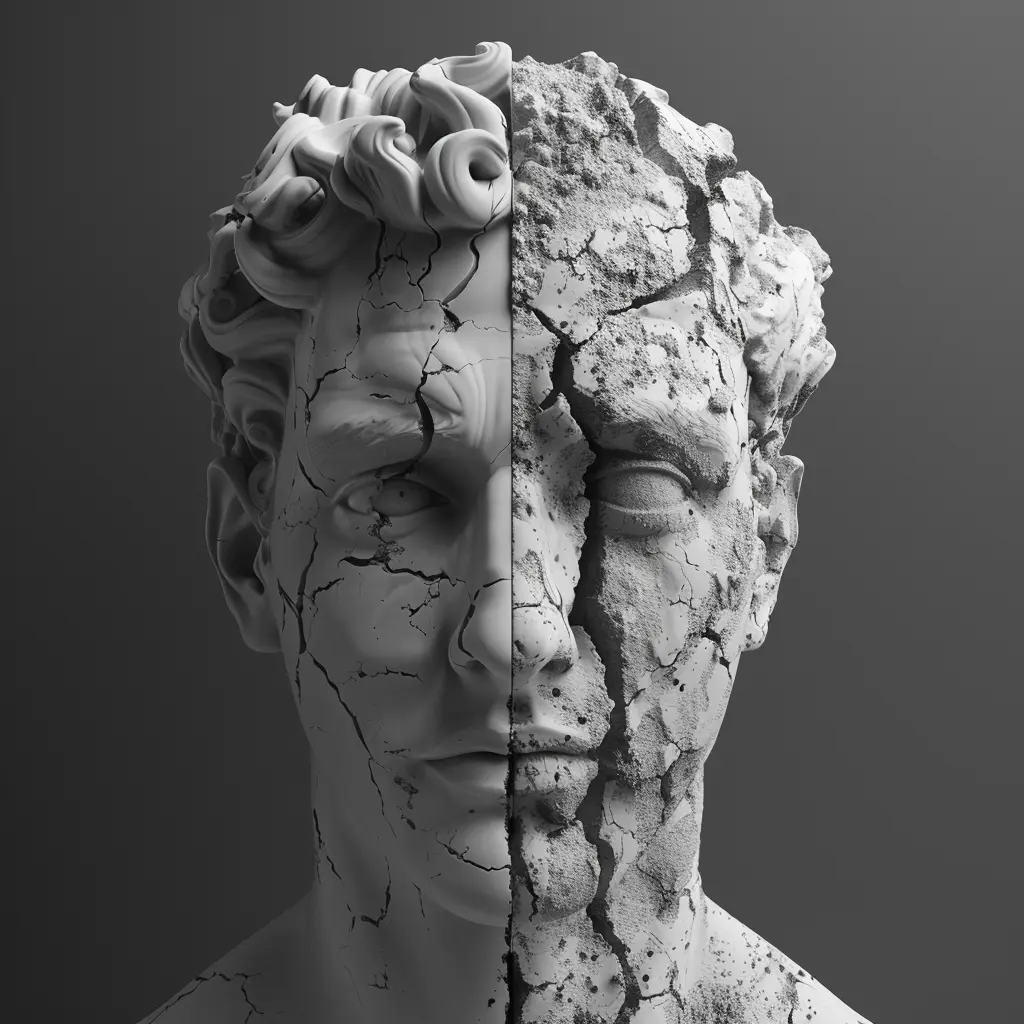Your body knows you're struggling before your mind admits it.
That chronic shoulder tension, the 3am anxiety spirals, the sudden disconnection from everything you love – these aren’t random. They’re your psyche’s alarm system, and they’re type-specific.
After tracking mental health patterns across thousands of Enneagram profiles, we’ve mapped exactly how each type breaks down, where they hold trauma in their bodies, and most importantly – the exact moment professional help becomes essential.
This isn’t about labeling or pathologizing. It’s about catching yourself (or someone you love) before the spiral becomes a crisis.
Why Mental Health Red Flags Vary by Enneagram Type
Your Enneagram type shapes not just your personality, but your specific vulnerabilities to mental health challenges. Each type has:
- Unique stress responses rooted in childhood survival strategies
- Specific body areas where emotional pain manifests physically
- Predictable breakdown patterns when coping mechanisms fail
- Clear escalation stages from manageable to crisis
Understanding these patterns transforms vague worry into actionable awareness.
Type 1: The Perfectionist’s Pressure Cooker
Ones often struggle with intense self-criticism and a fear of making mistakes. This can lead to burnout, anxiety, and in severe cases, obsessive-compulsive tendencies.
Mental Health Red Flags
- Obsessive reorganizing - Rearranging workspace/home multiple times daily
- Should-statement spirals - “I should have…” dominates their vocabulary
- Perfection paralysis - Unable to start tasks for fear of imperfection
- Micro-criticism - Finding flaws in everything, especially themselves
- Rage episodes - Explosive anger over minor imperfections
- Control escalation - Attempting to control increasingly more aspects of life
Somatic Warning Signs
Where Type 1s Hold Trauma:
- Chronic jaw clenching and TMJ issues
- Shoulder blade tension that won’t release
- Digestive problems from constant internal pressure
- Tension headaches from overthinking
- Lower back pain from “carrying the world”
When to Seek Professional Help
- For workspace obsession: Suggest a ‘good enough’ challenge - maintain the current setup for a full week
- For “should” statements: Introduce a ‘compassion jar’ - drop a coin in for each self-critical phrase, then donate to charity
- For physical tension: Teach a quick progressive muscle relaxation technique
- For delegation issues: Offer to take on a small task, framing it as a learning opportunity for you
Immediate professional help needed when:
- Perfectionism prevents basic daily functioning
- Self-harm thoughts related to “not being good enough”
- Obsessive-compulsive behaviors dominate their day
- Physical symptoms (migraines, IBS) become chronic
- They express feeling “fundamentally broken”
Recovery Indicators
Signs Type 1 is healing:
- Using phrases like “good enough” without distress
- Accepting mistakes as learning opportunities
- Physical tension visibly decreasing
- Able to delegate without micromanaging
- Laughing at imperfections instead of spiraling
Type 2: The Helper’s Hidden Cry for Help
Twos often struggle with setting boundaries and acknowledging their own needs. This can lead to resentment, burnout, and codependent behaviors.
Mental Health Red Flags
- Compulsive helping - Cannot say no even when exhausted
- Martyrdom complex - “No one appreciates what I do” becomes constant
- Emotional manipulation - Using guilt to control others
- Identity crisis - Complete loss of self outside helping role
- Resentment explosion - Sudden rage after prolonged giving
- Boundary collapse - Taking on others’ emotions as their own
Somatic Warning Signs
Where Type 2s Hold Trauma:
- Heart palpitations and chest tightness
- Chronic fatigue from emotional labor
- Upper back pain between shoulder blades
- Stress-related skin conditions
- Hormonal imbalances from people-pleasing stress
When to Seek Professional Help
Immediate professional help needed when:
- Helping behaviors become self-destructive
- Identity completely depends on being needed
- Resentment leads to vengeful thoughts
- Physical exhaustion causes health problems
- They express feeling “used up” or “empty”
Recovery Indicators
Signs Type 2 is healing:
- Setting boundaries without guilt
- Expressing own needs directly
- Taking time for self without justification
- Accepting help from others gracefully
- Finding identity beyond caretaking role
Type 3: The Achiever’s Authenticity Alarm
Threes often struggle with tying their self-worth to achievements. This can lead to workaholism, impostor syndrome, and a loss of authentic self.
Mental Health Red Flags
- Identity shapeshifting - Completely changing personality for different audiences
- Workaholic collapse - Working until physical breakdown
- Achievement addiction - Needing bigger wins to feel anything
- Imposter syndrome - Crushing fear of being exposed as fraud
- Emotional numbness - Complete disconnection from feelings
- Success depression - Achieving goals brings emptiness, not joy
Somatic Warning Signs
Where Type 3s Hold Trauma:
- Chronic muscle tension from constant “performance mode”
- Adrenal fatigue from pushing too hard
- Heart issues from sustained stress
- Insomnia from inability to “turn off”
- Panic attacks when forced to be still
When to Seek Professional Help
Immediate professional help needed when:
- Work becomes only source of identity
- Physical symptoms from overwork emerge
- Substance use to maintain performance
- Suicidal ideation if they “fail”
- Complete inability to rest or be present
Recovery Indicators
Signs Type 3 is healing:
- Sharing failures without shame
- Finding worth beyond achievements
- Enjoying process, not just results
- Authentic self-expression emerging
- Able to be vulnerable about struggles
Type 4: The Individualist’s Emotional Tsunami Warning
Fours often struggle with feelings of defectiveness and a tendency to romanticize suffering. This can lead to depression, identity issues, and self-sabotage.
Mental Health Red Flags
- Emotional amplification - Every feeling becomes overwhelming and dramatic
- Melancholy addiction - Romanticizing pain and seeking tragic experiences
- Identity crisis spirals - “I don’t know who I am” becomes constant refrain
- Creative paralysis - Unable to create due to nothing feeling “authentic” enough
- Comparison obsession - Everyone else’s life seems more meaningful
- Self-harm ideation - Thoughts of ending pain through dramatic action
Somatic Warning Signs
Where Type 4s Hold Trauma:
- Intense chest constriction and heart pain
- Chronic throat tension affecting voice
- Emotional eating or complete appetite loss
- Sleep disruption from emotional intensity
- Physical restlessness when feelings peak
When to Seek Professional Help
Immediate professional help needed when:
- Self-harm thoughts become specific plans
- Identity confusion prevents daily functioning
- Emotional intensity causes relationship destruction
- Creative expression turns entirely self-destructive
- They express feeling “too broken to fix”
Recovery Indicators
Signs Type 4 is healing:
- Creating without needing it to be “perfect” or tragic
- Appreciating ordinary moments of beauty
- Stable relationships without drama cycles
- Self-compassion during emotional storms
- Finding meaning in helping others heal
Type 5: The Investigator’s Information Overload Alert
Fives often struggle with feeling overwhelmed by the world and retreating into their minds. This can lead to social isolation, anxiety, and detachment from physical needs.
Mental Health Red Flags
- Information hoarding - Collecting knowledge but never applying it
- Emotional detachment - Analyzing feelings instead of feeling them
- Self-care collapse - Forgetting basic needs like eating, bathing
- Reality avoidance - Living entirely in mental constructs
- Social withdrawal - Complete isolation from human contact
- Energy depletion - Feeling drained by any social interaction
Somatic Warning Signs
Where Type 5s Hold Trauma:
- Complete energy depletion and chronic fatigue
- Digestive issues from irregular eating
- Poor circulation and feeling cold
- Tension headaches from mental overload
- Dissociation from body sensations
When to Seek Professional Help
Immediate professional help needed when:
- Basic self-care completely abandoned
- Reality testing becomes impaired
- Isolation leads to paranoid thoughts
- Physical health deteriorates from neglect
- They express feeling “not real” or dissociated
Recovery Indicators
Signs Type 5 is healing:
- Engaging with world through action, not just observation
- Maintaining basic self-care routines
- Sharing knowledge to help others
- Expressing emotions without analyzing them
- Building sustainable social connections
Type 6: The Loyalist’s Anxiety Alarm System
Sixes often struggle with anxiety and worst-case scenario thinking. This can lead to paranoia, indecisiveness, and seeking excessive reassurance.
Mental Health Red Flags
- Reassurance addiction - Constantly seeking validation for decisions
- Catastrophic thinking - Every situation becomes worst-case scenario
- Paranoid spirals - Sudden distrust of everyone and everything
- Analysis paralysis - Unable to make any decisions due to fear
- Authority rebellion - Rejecting all guidance when overwhelmed
- Physical anxiety - Panic attacks, insomnia, digestive issues
Somatic Warning Signs
Where Type 6s Hold Trauma:
- Chronic stomach problems and IBS
- Tension in jaw from teeth grinding
- Shallow breathing and chest tightness
- Muscle tension in neck and shoulders
- Nervous system hypervigilance
When to Seek Professional Help
Immediate professional help needed when:
- Anxiety prevents basic daily functioning
- Paranoid thoughts become delusional
- Physical symptoms require medical attention
- They express feeling “unsafe” everywhere
- Panic attacks become frequent and severe
Recovery Indicators
Signs Type 6 is healing:
- Making decisions without excessive consultation
- Trusting their own judgment more
- Physical anxiety symptoms decreasing
- Building faith in their support system
- Taking calculated risks without panic
Type 7: The Enthusiast’s Escape Hatch Alert
Sevens often struggle with avoiding pain and negative emotions. This can lead to addiction, commitment issues, and a scattered approach to life.
Mental Health Red Flags
- Manic planning - Endless future projects to avoid present pain
- Depth avoidance - Cannot tolerate any serious conversation
- Substance escalation - Using drugs/alcohol to maintain euphoria
- Commitment phobia - Abandoning everything that requires follow-through
- Restless desperation - Frantic need to stay busy or entertained
- Crash periods - Sudden depression when forced to slow down
Somatic Warning Signs
Where Type 7s Hold Trauma:
- Scattered energy and inability to focus
- Digestive issues from poor eating habits
- Sleep problems from overstimulation
- Addiction potential in multiple areas
- Chronic restlessness and fidgeting
When to Seek Professional Help
Immediate professional help needed when:
- Substance use becomes daily coping mechanism
- Unable to experience any positive emotions naturally
- Manic episodes followed by severe crashes
- Abandoning all responsibilities repeatedly
- They express feeling “trapped” and desperate
Recovery Indicators
Signs Type 7 is healing:
- Finding depth and meaning in simple experiences
- Following through on commitments consistently
- Sitting with difficult emotions without escaping
- Building stable, lasting relationships
- Natural joy returning without artificial stimulation
Type 8: The Challenger’s Vulnerability Fortress Alarm
Eights often struggle with vulnerability and fear of being controlled. This can lead to aggression, power struggles, and difficulty in close relationships.
Mental Health Red Flags
- Rage escalation - Explosive anger at minor provocations
- Control obsession - Needing to dominate every situation
- Vulnerability terror - Complete inability to show softness
- Isolation through intimidation - Pushing everyone away
- Reckless behavior - Taking dangerous risks to feel alive
- Emotional shutdown - Complete disconnection from feelings
Somatic Warning Signs
Where Type 8s Hold Trauma:
- Chronic muscle tension and headaches
- High blood pressure from constant stress
- Digestive issues from suppressed emotions
- Lower back pain from “carrying burdens”
- Jaw tension from holding back words
When to Seek Professional Help
Immediate professional help needed when:
- Violence becomes a consideration
- Complete emotional shutdown persists
- Destructive behavior escalates
- They express feeling “like a monster”
- Isolation becomes total and aggressive
Recovery Indicators
Signs Type 8 is healing:
- Showing vulnerability without feeling weak
- Using strength to protect rather than dominate
- Expressing emotions beyond anger
- Building collaborative rather than controlling relationships
- Finding power in service to others
Type 9: The Peacemaker’s Disappearing Act Alert
Nines often struggle with numbing out and avoiding conflict. This can lead to depression, passive-aggressive behavior, and a loss of self.
Mental Health Red Flags
- Complete self-erasure - No opinions, preferences, or desires expressed
- Dissociation episodes - Mentally “checking out” for extended periods
- Passive-aggressive resentment - Indirect anger through stubbornness
- Identity dissolution - Becoming whoever others need them to be
- Neglect spirals - Abandoning self-care and responsibilities
- Emotional numbing - Inability to feel anything deeply
Somatic Warning Signs
Where Type 9s Hold Trauma:
- Chronic fatigue and low energy
- Weight fluctuations from emotional eating
- Posture issues from “shrinking” themselves
- Numbness in extremities
- General body heaviness and lethargy
When to Seek Professional Help
Immediate professional help needed when:
- Complete inability to make any decisions
- Dissociation becomes constant state
- Self-neglect threatens physical health
- They express feeling “invisible” or “non-existent”
- Passive-aggressive behaviors become destructive
Recovery Indicators
Signs Type 9 is healing:
- Making decisions without endless deliberation
- Expressing preferences and boundaries clearly
- Taking action on personal goals consistently
- Staying present during conflicts
- Discovering authentic interests and passions
Crisis Resources and Emergency Support
If you or someone you know is experiencing suicidal thoughts or severe mental health crisis:
- National Suicide Prevention Lifeline: 988 (US)
- Crisis Text Line: Text HOME to 741741
- International Association for Suicide Prevention: https://www.iasp.info/resources/Crisis_Centres/
- Emergency Services: Call 911 or your local emergency number
Type-Specific Crisis Patterns:
- Types 1, 6: Often express crisis through perfectionism or anxiety
- Types 2, 9: May hide crisis to avoid “burdening” others
- Types 3, 8: Might express crisis through anger or overwork
- Types 4, 5: May withdraw completely when in crisis
- Type 7: Crisis often follows crash from manic episode
How to Use This Guide Effectively
For Self-Assessment:
- Identify your type’s specific red flags
- Monitor your somatic warning signs
- Have a crisis intervention plan ready
- Build support network aware of your patterns
For Supporting Others:
- Learn their type’s unique vulnerabilities
- Watch for escalation patterns
- Know when to suggest professional help
- Approach with type-appropriate sensitivity
The Path Forward: From Recognition to Recovery
Mental health isn’t a destination—it’s a journey of awareness, acceptance, and action. Each Enneagram type has a unique path to healing, but all require:
- Conscious recognition of unhealthy patterns
- Somatic awareness of where trauma lives in the body
- Professional support when patterns become unmanageable
- Community connection with understanding allies
- Patience with the nonlinear nature of healing
Your personality type isn’t a prison—it’s a map. Use it wisely, with compassion for yourself and others on this shared journey of becoming whole.
Remember: These red flags are invitations for deeper self-care, not judgments about your worth. Healing is always possible, and help is always available.


